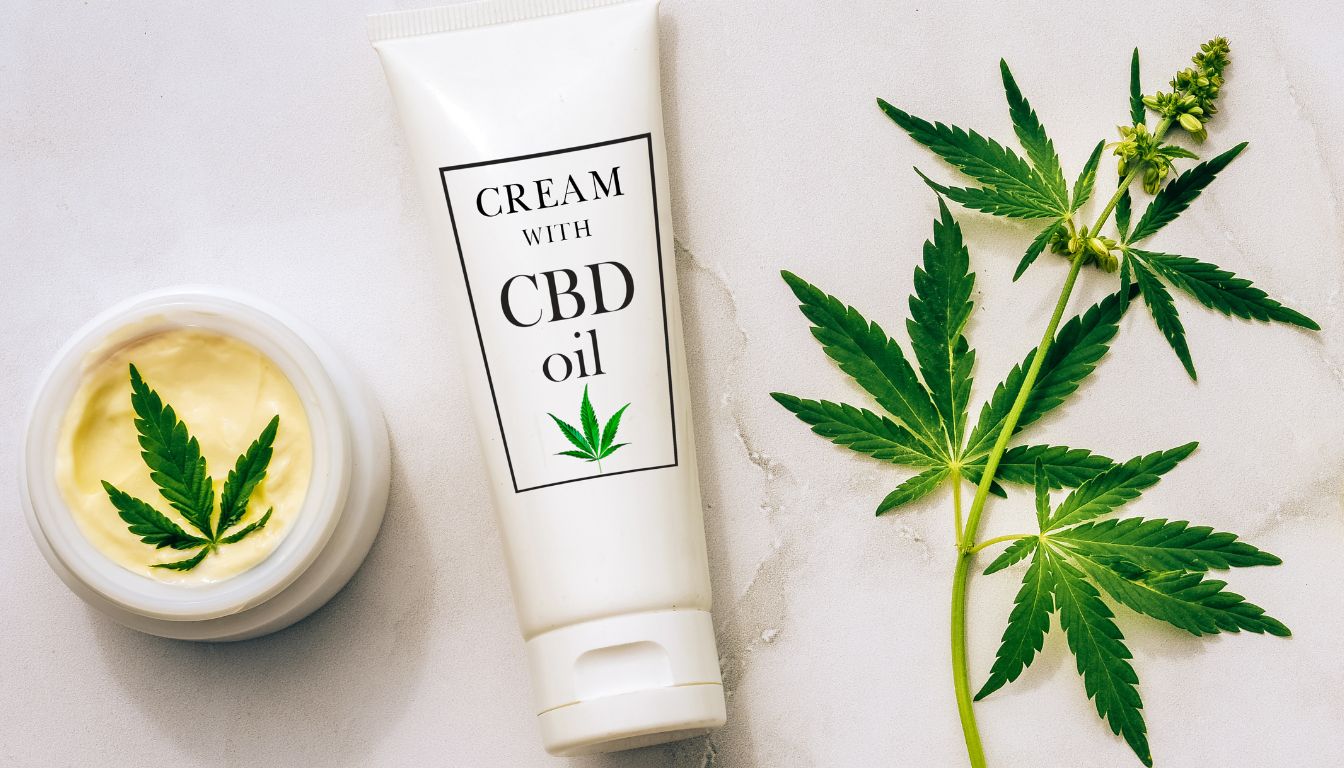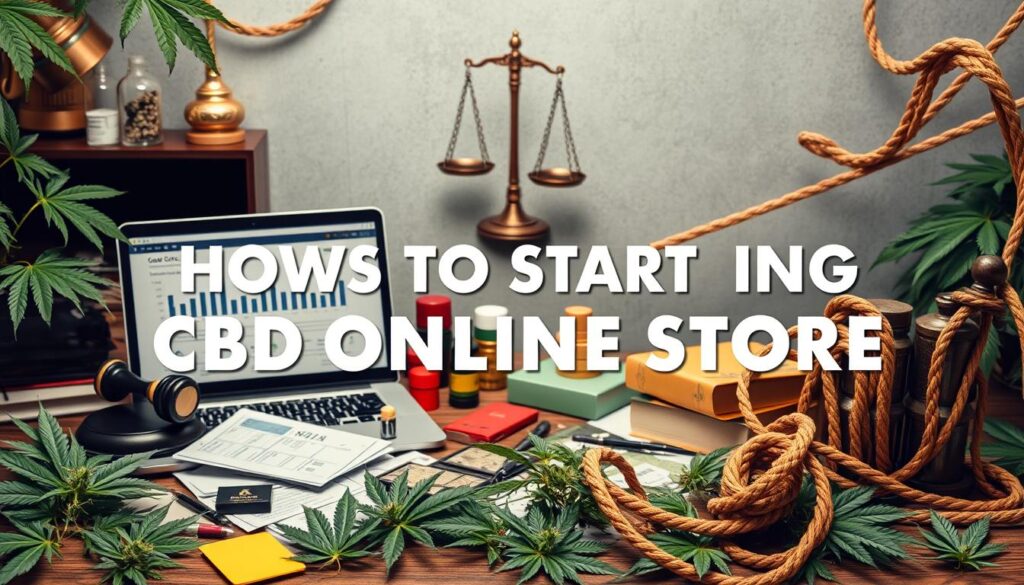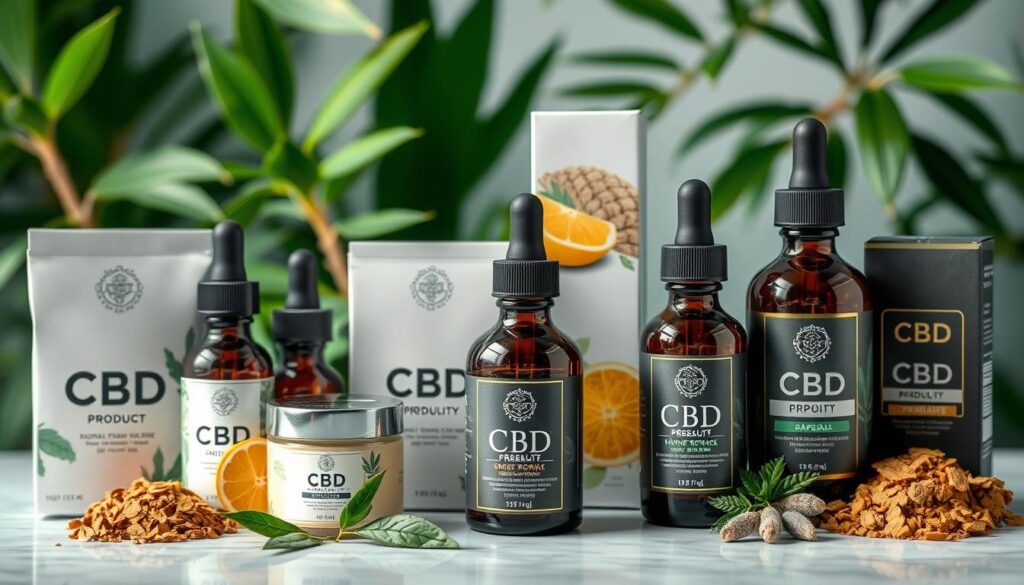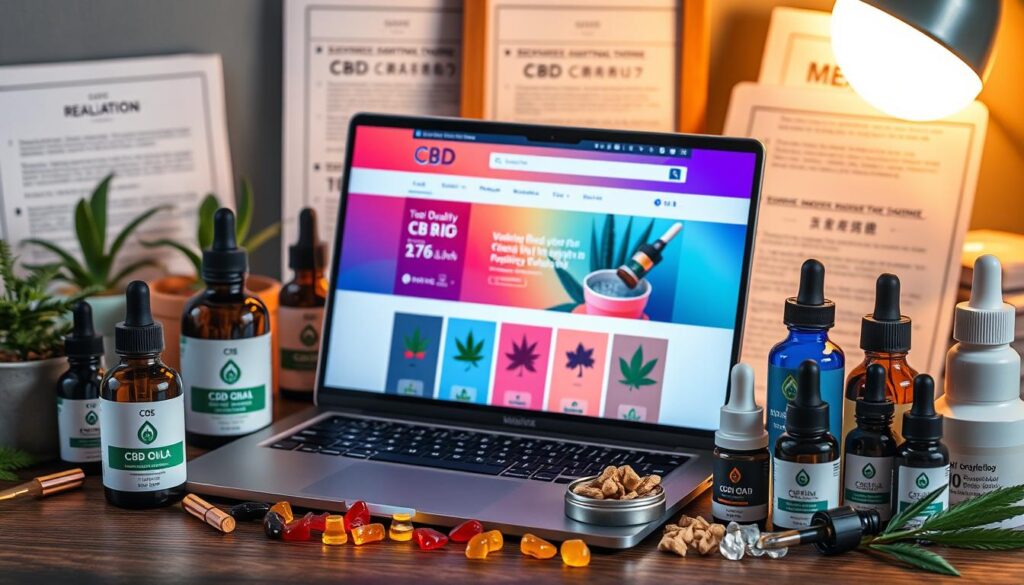Want to start a CBD business online? This guide will help you navigate the crucial steps to successfully start a CBD business online: legal requirements, product selection, online store setup, and industry challenges. By following these steps, you can launch your CBD business online successfully and tap into a growing market.
Key Takeaways
The CBD market is projected to reach $23 billion in the U.S. by 2025, highlighting significant growth opportunities for new businesses.
Legal compliance is essential for selling CBD online; understanding federal and state regulations will help avoid legal issues and build consumer trust.
Selecting high-quality CBD products and establishing a reliable online presence are critical for success in the competitive CBD market.
Understanding CBD and Its Market Potential
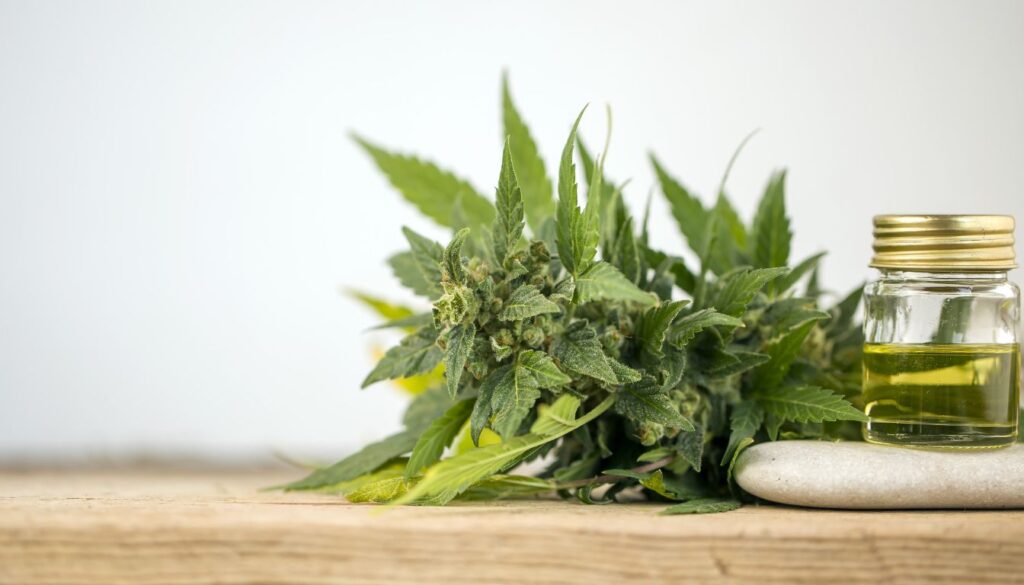
Cannabidiol (CBD) is a natural compound found in the cannabis plant, known for its therapeutic benefits without the psychoactive effects associated with THC. Used widely for pain relief, anxiety reduction, and other health benefits, CBD has gained significant acceptance and legalization across various regions. Unlike THC, CBD does not induce a “high,” making it a more appealing option for a broader audience.
The CBD market is projected to grow exponentially in the coming years. In the United States alone, the market is expected to reach a staggering $23 billion by 2025, with a compound annual growth rate (CAGR) of 16.2 percent. North America, and particularly the United States, currently dominates the CBD market, valued at $2.58 billion as of 2024. This rapid growth is a clear indicator of the market’s potential and the opportunities available for new CBD businesses.
Globally, the nutraceuticals sector of the CBD market is also experiencing significant growth. Valued at $4.5 billion in 2024, it is projected to soar to $17.9 billion by 2034. This upward trend highlights the increasing consumer interest in health and wellness products, further bolstering the demand for CBD. The overall CBD market is anticipated to reach $6.93 billion by 2029, reflecting a steady growth trajectory.
With such promising market potential, many entrepreneurs are exploring the idea of launching their own CBD businesses. The growing acceptance and demand for CBD products present a lucrative opportunity for those looking to enter the cannabis industry. Whether you’re considering CBD oils, edibles, topicals, or other products, understanding the market dynamics is crucial for making informed business decisions.
Legal Considerations for Selling CBD Online
Understanding the legal landscape is crucial when starting a CBD business. Fortunately, the 2018 Farm Bill legalized hemp-derived CBD products at the federal level, provided they contain less than 0.3% THC. However, it’s essential to be aware of and comply with both federal and state regulations, as CBD laws can vary significantly from one state to another.
At the federal level, there are no laws prohibiting the sale of CBD products that meet the THC threshold. However, the FDA closely monitors CBD products, especially those marketed with unapproved health claims. It’s crucial to avoid making any medical claims about your CBD products to stay compliant with FDA regulations. Additionally, some states may require specific licenses or third-party testing to ensure product safety and compliance.
Research and understand the specific licensing requirements in your state before selling CBD online. Some states may not require a business license but might have other certification requirements for CBD sales. The cost of obtaining a CBD license can vary widely, from a few hundred to several thousand dollars, depending on the state. Ensuring that your business meets all regulatory requirements will help you avoid legal issues and build consumer trust.
Developing company policies that incorporate legal obligations can enhance compliance management. Monitor evolving regulations, as the legal landscape for CBD is continually changing. The FDA has indicated the need for a new regulatory pathway for CBD products, which could impact how you market and sell your products in the future.
Ensure your advertising practices comply with relevant laws and regulations. Misleading advertisements can result in penalties and damage your brand’s reputation. Staying informed and following legal guidelines helps build a compliant and successful CBD business.
Choosing the Right CBD Products to Sell

Choosing the right products is fundamental to a successful CBD business. The diverse range of CBD products available includes oils, edibles, capsules, beverages, and topicals. Each product category caters to different consumer preferences and needs, making it essential to understand market demands and trends. Consider product type, CBD source, target customers, and market demand when choosing products.
High-quality, organic hemp is key to ensuring product safety and efficacy. Third-party lab testing provides transparency and builds consumer trust by verifying product purity and potency.
A variety of products that meet consumer needs can help you sell CBD products in the competitive CBD market.
CBD Oils and Tinctures
CBD oils and tinctures are among the most popular products in the CBD market. Versatility and ease of use make these products a consumer favorite. These products can be taken sublingually, added to food and beverages, or even applied topically. CBD drops and sprays, typically made from CBD oil mixed with a carrier oil, offer convenient and customizable dosing options.
Their flexibility and ability to cater to various consumer needs drive the popularity of CBD oils and tinctures. Whether your customers are seeking relief from pain, anxiety, or other conditions, offering high-quality CBD oils and tinctures can help you attract and retain a loyal customer base.
CBD Edibles and Beverages
CBD edibles and beverages are rapidly gaining popularity among consumers who prefer familiar consumption methods without the taste of oil. The global CBD food and beverage market was valued at $7 billion in 2023 and is expected to grow to $57.6 billion by 2032, highlighting the significant demand in this category. Popular forms of CBD edibles include chocolates, gummies, baked goods, and drinks.
CBD-infused foods and beverages tap into a broader market and cater to consumers seeking convenient and enjoyable consumption methods. Stay informed about consumer preferences and market trends to select products that resonate with your audience.
CBD Topicals
CBD topicals are another popular category, offering localized relief for conditions such as pain and inflammation. The CBD cosmetics and skincare market was valued at $964.1 million in 2022 and is predicted to reach $8.62 billion by 2030, indicating substantial growth potential. These products come in various forms, including lotions, soaps, bath bombs, and sprays.
Topicals offer benefits to consumers who prefer not to ingest CBD, as they are absorbed through the skin. Offering high-quality CBD topicals attracts customers seeking non-ingestible options and expands market reach.
Setting Up Your Online CBD Store
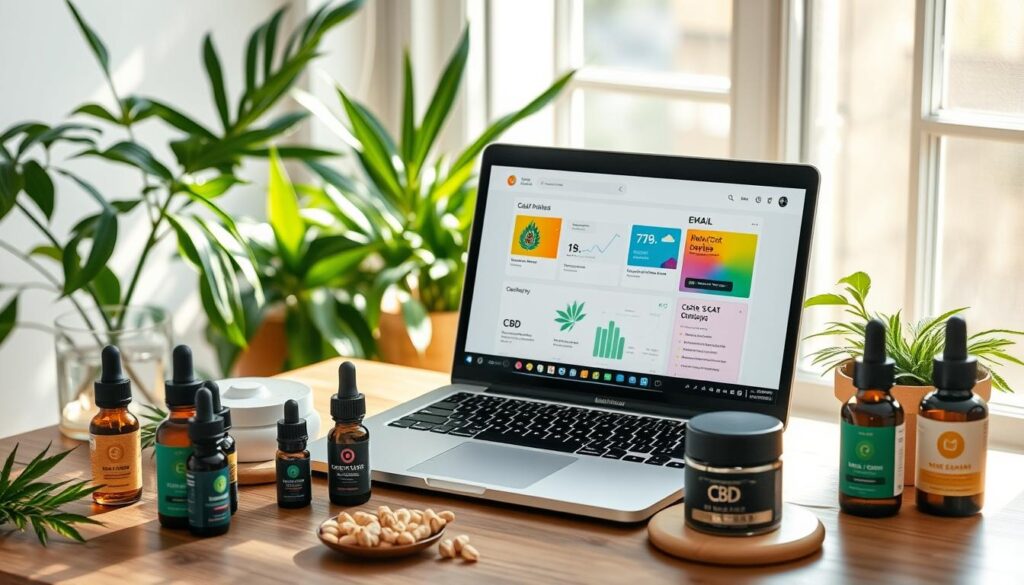
An online store is a crucial step in launching your CBD business. Choosing the right ecommerce platform can greatly influence your store’s efficiency and customer satisfaction. Not every platform allows CBD stores due to regulatory complexities, so it’s essential to select one that is compliant and supports your business needs. Designing a user-friendly website with a well-structured product catalog will enhance the shopping experience for your customers and help you sell CBD online.
After designing your store layout and organizing products, establish shipping and payment terms for smooth operations. A professional website is essential for selling products and interacting with customers, making it a key component of your online CBD business.
Why Choose BigCommerce
BigCommerce is recommended for starting a CBD business due to its robust features and CBD-friendly policies. The platform supports a range of B2C and B2B ecommerce functionalities, making it scalable and capable of growing with your business. BigCommerce offers user-friendly payment gateways, outstanding support, and mobile-friendly designs, all of which contribute to a seamless shopping experience.
Features like drag-and-drop page builders, limitless customization, and 0% transaction fees make BigCommerce both functional and visually appealing. Its ability to integrate with CBD-friendly payment processors makes it an ideal choice for CBD retailers.
Building Your Website
A professional and functional website is crucial for a strong online presence. Choose a domain name that reflects your brand and select a web-building platform that meets your needs. High-quality product images are vital, as 90% of shoppers consider them a significant factor in their purchasing decisions. Invest in high-quality product photography or take good ecommerce pictures at home if on a budget.
Ensure that your website provides pertinent product information, including descriptions, prices, and photos. An ecommerce platform like BigCommerce can streamline website development and reduce the timeline. These platforms manage hosting and infrastructure, letting you focus on business growth.
Ensuring Compliance
Compliance is vital for running a CBD business. All CBD products must be labeled as dietary supplements to meet regulatory requirements. A compliance plan helps you keep up with evolving regulations and ensures legal compliance. Monitor customer reviews and remove inappropriate drug or medical claims to maintain compliance and protect your brand.
By adhering to local and federal laws, you can avoid legal issues and build consumer trust. Compliance impacts customer satisfaction and safeguards your business from regulatory actions.
Finding a Reliable CBD Supplier
A reliable CBD supplier is vital for maintaining product quality and safety. The lightly regulated CBD market can lead to issues with contaminants and inaccurate labeling. Seek suppliers that offer high-quality products, hold state or federal certification, and conduct third-party lab testing. Certifications like USDA Organic, Good Manufacturing Practices, and FDA facility registrations indicate a reputable supplier.
Third-party lab testing verifies the purity and potency of CBD products. A Certificate of Analysis (COA) ensures product safety and compliance, making it essential to request from suppliers. Sampling products before committing to a supplier helps assess quality and ensures they meet your standards.
QR codes on products enhance transparency by providing consumers access to lab results. Partnering with a reputable supplier builds consumer trust and ensures product quality, critical for business success.
Marketing Your CBD Business Online

Marketing is essential for any business, including the CBD industry. A trustworthy brand helps you stand out in a crowded market and ensures customer reliance. Customer testimonials offer valuable insights into product quality and distributor reliability, building trust with potential buyers. Marketing CBD products is challenging due to regulatory restrictions on platforms like Google and Facebook.
A robust marketing system is crucial for customer acquisition in the competitive CBD industry. Listening to customer feedback and monitoring social channels helps understand your audience and tailor marketing strategies. Leverage organic content, SEO, social media, and email marketing to effectively promote your CBD products and grow your business.
SEO and Content Marketing
Incorporating SEO best practices enhances online visibility and helps potential customers find your CBD products more easily. Publishing well-researched content can dominate search engine results and drive organic traffic to your website. Key components an SEO professional should audit include site speed, meta data, image optimization, and site functionality.
A blog on your CBD website builds relationships with customers and partners through informative and engaging content. Writing about related topics drives traffic and increases the likelihood of sales.
Focusing on content marketing and SEO strategies establishes expertise and improves marketability.
Social Media Marketing
Social media marketing is powerful for reaching younger consumers who turn to platforms like Instagram and Twitter for CBD information and inspiration. Advertising CBD products on social media is challenging, with risks of account suspensions or bans for paid ads.
Navigate restrictions by focusing on organic content strategies like sharing educational posts, customer stories, and product updates. Engage with your audience through comments and direct messages to build a loyal community around your brand.
Leverage social media to effectively market your CBD business and reach a broader audience.
Email Marketing
Email marketing is essential for nurturing leads and driving sales in your CBD business. An email list lets you sell products directly to customers, enhancing revenue and fostering long-term relationships. Offer discounts or free informational PDFs in exchange for email addresses to grow your list and attract customers.
Targeted campaigns and regular engagement with subscribers maximize the effectiveness of email marketing efforts. Providing valuable content and personalized offers keeps your audience engaged and encourages repeat purchases, boosting online store success.
Managing Payment Processing and Shipping
Efficient payment processing and shipping ensure smooth operations in your CBD business. CBD merchants are often labeled as high-risk, which can complicate securing merchant accounts and payment processors. Choose a payment processor that supports CBD transactions efficiently, as additional fees may apply for third-party processors.
Setting up logistics includes determining shipping and payment terms to ensure a seamless customer experience. Fulfillment technology helps manage CBD products, sync with e-commerce platforms, and streamline logistics.
Efficient payment processing and shipping solutions provide a positive customer experience and drive business growth.
CBD-Friendly Payment Processors
CBD sellers should partner with specialized payment processors that focus on high-risk businesses. Options like Square, Bankful, PayKings, and Easy Pay Direct are known to support CBD transactions. Secure a merchant account with a high-risk account provider to process payments smoothly.
CBD payment gateways must comply with regulations like age verification and product disclaimers. Choosing a CBD-friendly payment processor ensures compliance and avoids disruptions in your payment processing system.
Shipping and Fulfillment Options
CBD businesses have shipping and fulfillment options like in-house fulfillment, dropshipping, and third-party logistics (3PL). In-house fulfillment, ideal for small or new businesses, involves keeping inventory and handling shipping locally. Partnering with a fulfillment center like ShipBob as your business grows can manage increasing demand and reduce shipping times.
Dropshipping lets the manufacturer handle product procurement and shipping, while the seller focuses on marketing. Fulfillment technology enhances shipping management by setting rates, managing logistics, and printing labels.
Choosing the right fulfillment option ensures efficient delivery and customer satisfaction.
Overcoming Challenges in the CBD Industry

The CBD industry presents unique challenges, including a lack of clear federal regulatory frameworks, which leads to inconsistent product quality and labeling. Legislative complexities, such as proposed state laws, can further complicate the market by restricting legal access to CBD products. Staying informed about regulatory changes and preparing backup plans can help CBD businesses remain resilient in a fluid market.
Despite these challenges, there are opportunities for growth within the CBD category. Some segments, like calmative supplements, have seen substantial sales growth despite overall market fluctuations. Diversifying product lines, as seen with companies incorporating functional mushrooms, can help adapt to market demands.
Securing additional financing via business loans can be difficult due to the perceived high risk of CBD businesses. Financial institutions may hesitate to work with CBD brands, but being adaptable and staying informed can help navigate these challenges. By overcoming these hurdles, CBD businesses can thrive in a competitive and evolving industry.
Summary
Starting a CBD business online in 2024 offers immense potential and rewards. From understanding the market dynamics and navigating legal considerations to choosing the right products and setting up your online store, this guide has covered the essential steps to help you succeed. By partnering with reliable suppliers, implementing effective marketing strategies, and ensuring compliance, you can build a thriving CBD business.
Remember, the key to success lies in staying informed, adaptable, and committed to providing high-quality products and a seamless customer experience. With the right approach, you can capitalize on the growing demand for CBD and create a successful online business.
Frequently Asked Questions
Do I need a special license to sell CBD products online?
Yes, you need to obtain a special license to sell CBD products online, as requirements vary by state and may include specific certifications or third-party testing. Always verify the regulations in your specific area to ensure compliance.
What are the most popular CBD products to sell?
The most popular CBD products to sell are oils and tinctures, edibles and beverages, and topicals. These categories consistently meet consumer demand and preferences.
How can I ensure the quality of my CBD products?
To ensure the quality of your CBD products, partner with reputable suppliers who offer third-party lab testing and a Certificate of Analysis (COA). This verification process is crucial for confirming the quality and safety of your products.
Which ecommerce platform is best for selling CBD products?
BigCommerce is the best ecommerce platform for selling CBD products due to its CBD-friendly policies, scalability, and robust functionalities.
How can I market my CBD business effectively?
To effectively market your CBD business, focus on SEO and content marketing, leverage social media strategies, and implement email marketing to enhance your online presence and draw in customers.
